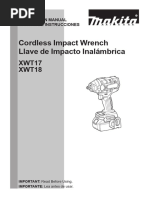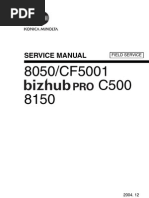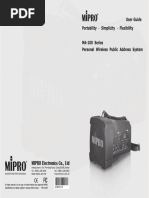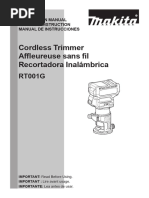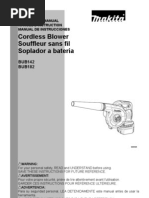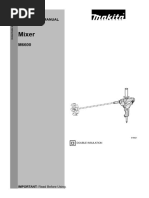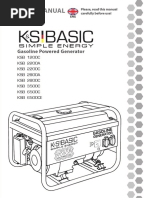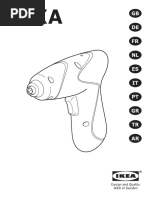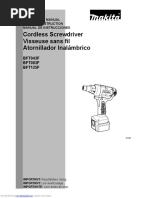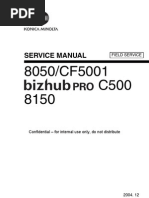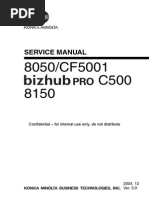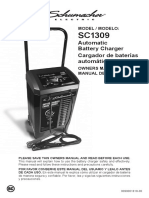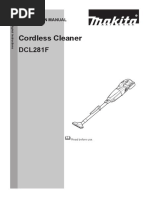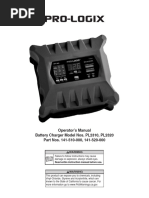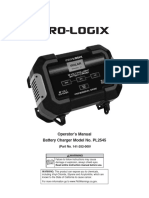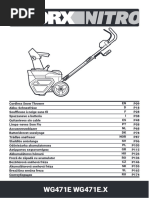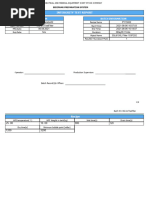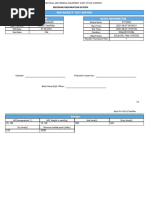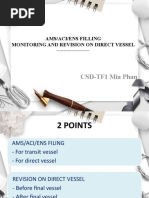0 ratings0% found this document useful (0 votes)
25 viewsShould Should Not
Should Should Not
Uploaded by
duy phanThe document provides instructions for using electrical equipment safely. It notes that instructions should be written impersonally using "should" rather than directly, such as with "you." For emphasis, "must" can be used instead of "should" to indicate something is required rather than suggested. The examples show using a high-resistance voltmeter and not inserting a fuse into an earth conductor.
Copyright:
© All Rights Reserved
Available Formats
Download as PDF, TXT or read online from Scribd
Should Should Not
Should Should Not
Uploaded by
duy phan0 ratings0% found this document useful (0 votes)
25 views1 pageThe document provides instructions for using electrical equipment safely. It notes that instructions should be written impersonally using "should" rather than directly, such as with "you." For emphasis, "must" can be used instead of "should" to indicate something is required rather than suggested. The examples show using a high-resistance voltmeter and not inserting a fuse into an earth conductor.
Original Title
18
Copyright
© © All Rights Reserved
Available Formats
PDF, TXT or read online from Scribd
Share this document
Did you find this document useful?
Is this content inappropriate?
The document provides instructions for using electrical equipment safely. It notes that instructions should be written impersonally using "should" rather than directly, such as with "you." For emphasis, "must" can be used instead of "should" to indicate something is required rather than suggested. The examples show using a high-resistance voltmeter and not inserting a fuse into an earth conductor.
Copyright:
© All Rights Reserved
Available Formats
Download as PDF, TXT or read online from Scribd
Download as pdf or txt
0 ratings0% found this document useful (0 votes)
25 views1 pageShould Should Not
Should Should Not
Uploaded by
duy phanThe document provides instructions for using electrical equipment safely. It notes that instructions should be written impersonally using "should" rather than directly, such as with "you." For emphasis, "must" can be used instead of "should" to indicate something is required rather than suggested. The examples show using a high-resistance voltmeter and not inserting a fuse into an earth conductor.
Copyright:
© All Rights Reserved
Available Formats
Download as PDF, TXT or read online from Scribd
Download as pdf or txt
You are on page 1of 1
12/8/2019
Study these instructions:
1. Use a high – resistance voltmeter
2. Do not insert a fuse in an earth conductor
In writing, instructions are often made impersonal using should
Examples:
1. A high – resistance voltmeter SHOULD be used
2. A fuse SHOULD NOT be inserted in an earth conductor
We can emphasize an instruction by using must
Examples:
1. A high – resistance voltmeter MUST be used
2. A fuse MUST NOT be inserted in an earth conductor
18
You might also like
- A Wind Turbine Recipe Book 2014 English Units EdtionFrom EverandA Wind Turbine Recipe Book 2014 English Units EdtionRating: 5 out of 5 stars5/5 (2)
- Schumacher DSR131 ProSeries Battery Charger Engine Starter ManualDocument32 pagesSchumacher DSR131 ProSeries Battery Charger Engine Starter ManualIrvin lopezNo ratings yet
- Schumacher SC 1353Document32 pagesSchumacher SC 1353Franklin Galo50% (2)
- Cordless Impact Driver: Instruction ManualDocument12 pagesCordless Impact Driver: Instruction ManualМикола КрайнякNo ratings yet
- Manual Llave Impacto Makita Xwt17Document28 pagesManual Llave Impacto Makita Xwt17ia.informatica.el.zuliaNo ratings yet
- SvcField8050 C500 CF5001MANUALDocument428 pagesSvcField8050 C500 CF5001MANUALMarius Man100% (1)
- Ma 100DB ManualDocument17 pagesMa 100DB ManualZoltánVályiNo ratings yet
- Milwaukee 49-24-0200 SER 414A MANUALDocument11 pagesMilwaukee 49-24-0200 SER 414A MANUALSjoling8211No ratings yet
- 87c5e23a-aba3-42d0-90c6-26c41c8aeaf8Document24 pages87c5e23a-aba3-42d0-90c6-26c41c8aeaf8pepe7777No ratings yet
- In-Line Cordless Screwdriver: Instruction ManualDocument7 pagesIn-Line Cordless Screwdriver: Instruction ManualPéter Farkas (fpjanos)No ratings yet
- Manual RT001GDocument100 pagesManual RT001GVictor AndresmNo ratings yet
- Cordless Blower Souffleur Sans Fil Soplador A Batería: BUB142 BUB182Document16 pagesCordless Blower Souffleur Sans Fil Soplador A Batería: BUB142 BUB182Kevin CheeNo ratings yet
- HPGR200: Submersible Grinder PumpDocument8 pagesHPGR200: Submersible Grinder Pumpallen_worstNo ratings yet
- M6600 ManualDocument8 pagesM6600 ManualStephan S ShajiNo ratings yet
- 5806B ManualDocument12 pages5806B ManualssgttgNo ratings yet
- Important Safety Instructions: CautionDocument1 pageImportant Safety Instructions: CautionVivis BistritaNo ratings yet
- Manual HFTShopLightDocument8 pagesManual HFTShopLightmike.the.maker.of.thingsNo ratings yet
- Generators BASIC GSL ENDocument25 pagesGenerators BASIC GSL ENValentin NiculaeNo ratings yet
- Despiece Del DestornilladorDocument72 pagesDespiece Del DestornilladorJulieta MacielNo ratings yet
- M9512B 13B-ManualDocument8 pagesM9512B 13B-ManualAnggi 'kaka' Aulia RahmanNo ratings yet
- WR100DZ ManualDocument20 pagesWR100DZ ManualQuiensoy Choc SapNo ratings yet
- Haier air manualDocument17 pagesHaier air manualScribdTranslationsNo ratings yet
- bft043f PDFDocument28 pagesbft043f PDFJust IoNo ratings yet
- 3828W5A1034Document42 pages3828W5A1034Alejandro PerezNo ratings yet
- Bizhub C500FieldServiceDocument430 pagesBizhub C500FieldServiceAylee_M100% (1)
- Version V1 4 in Year 2015: .: Downloaded From Manuals Search EngineDocument42 pagesVersion V1 4 in Year 2015: .: Downloaded From Manuals Search EngineAbdul Vazeer100% (1)
- Mellerware Bread MakerDocument23 pagesMellerware Bread MakerlanaNo ratings yet
- Informe de ErgonomíaDocument32 pagesInforme de ErgonomíaMaria juliana Moreno PeñaNo ratings yet
- KHR-2HV HardwareManual ForENGDocument56 pagesKHR-2HV HardwareManual ForENGEko Pandu PratamaNo ratings yet
- Cen-Tech 63759Document8 pagesCen-Tech 63759GregNo ratings yet
- Bizhub PRO C500 - 8150 - 8050 - CF5001 Service ManualDocument294 pagesBizhub PRO C500 - 8150 - 8050 - CF5001 Service ManualMarcio York CardosoNo ratings yet
- 758 sc1309Document23 pages758 sc1309Samsung BarryNo ratings yet
- Cordless Cleaner: DCL281FDocument16 pagesCordless Cleaner: DCL281Fgregory3No ratings yet
- Power Planer: Instruction ManualDocument8 pagesPower Planer: Instruction ManualCataNo ratings yet
- Power-Lite-Battery-System-User-Manual_V1.1_2020927 (1)Document20 pagesPower-Lite-Battery-System-User-Manual_V1.1_2020927 (1)samuelkabre557No ratings yet
- Makita XDT042 ManualDocument28 pagesMakita XDT042 ManualEarl George Greene IVNo ratings yet
- Wx169l Owners Manual WorxDocument28 pagesWx169l Owners Manual Worxmelvin2006No ratings yet
- 1062 Amp 6-12V Intelligent Battery Charger 1uDocument32 pages1062 Amp 6-12V Intelligent Battery Charger 1umduldic077.fugmiNo ratings yet
- Automatic Battery Charger Cargador de Baterías Automático Chargeur de Batterie AutomatiqueDocument28 pagesAutomatic Battery Charger Cargador de Baterías Automático Chargeur de Batterie AutomatiqueBryan CarballoNo ratings yet
- Air Circulation Fan 8'' ALDI BN-8U8Document24 pagesAir Circulation Fan 8'' ALDI BN-8U8240GL guyNo ratings yet
- No. 2D621-230E D: 0 Toshiba Medical Manufacturing CO., LTD. 2003-2008 All Rights ReservedDocument88 pagesNo. 2D621-230E D: 0 Toshiba Medical Manufacturing CO., LTD. 2003-2008 All Rights ReservedAriangel Maso100% (1)
- CS002G - en FR SPDocument44 pagesCS002G - en FR SPparminder GillNo ratings yet
- Amp 12V Intelligent Battery Charger Maintainer With Start Assistance 1Document34 pagesAmp 12V Intelligent Battery Charger Maintainer With Start Assistance 1jr7810487No ratings yet
- SCC-931T (P) : User's Manual Bedienungsanleitung Guide de L'utilisateur Guía Del Usuario Manuale D'usoDocument22 pagesSCC-931T (P) : User's Manual Bedienungsanleitung Guide de L'utilisateur Guía Del Usuario Manuale D'usoDCGBNo ratings yet
- Fujimoto Fuji Differential Pressure Transmitter FKK 4 Manuel D'utilisationDocument74 pagesFujimoto Fuji Differential Pressure Transmitter FKK 4 Manuel D'utilisationbahassiNo ratings yet
- Manual 3709Document28 pagesManual 3709mr.bstark1No ratings yet
- Drill 6411-6412-6413 Instruction ManualDocument8 pagesDrill 6411-6412-6413 Instruction ManualsunhuynhNo ratings yet
- R5Document15 pagesR5David HernandezNo ratings yet
- User ManualDocument30 pagesUser ManualMourad Testing AccountNo ratings yet
- DRUMMOND Well Pump ManualDocument12 pagesDRUMMOND Well Pump ManualJosh Parker100% (1)
- SPA200 Owner's ManualDocument24 pagesSPA200 Owner's ManualCristian Ferney Castro CardozoNo ratings yet
- Power Planer: Instruction ManualDocument8 pagesPower Planer: Instruction ManualCataNo ratings yet
- as.116296515Document188 pagesas.116296515shortmann84No ratings yet
- It082b 413 01 Ib PDFDocument12 pagesIt082b 413 01 Ib PDFReyna Carolina SanchezNo ratings yet
- Kairn_user_manual_rev2Document22 pagesKairn_user_manual_rev2reparateurnantesNo ratings yet
- I, Reading and ComprehensionDocument5 pagesI, Reading and Comprehensionduy phanNo ratings yet
- PY myPrintCoverIT6Document8 pagesPY myPrintCoverIT6duy phanNo ratings yet
- PY myPrintCoverIT5Document9 pagesPY myPrintCoverIT5duy phanNo ratings yet
- Examples For S7WebServer DOC v20 enDocument84 pagesExamples For S7WebServer DOC v20 enelzion zionNo ratings yet
- I, Reading and ComprehensionDocument5 pagesI, Reading and Comprehensionduy phanNo ratings yet
- Circuit Elements: Unit 2Document3 pagesCircuit Elements: Unit 2duy phanNo ratings yet
- Homework 13 (Wireless Communications) SolutionDocument2 pagesHomework 13 (Wireless Communications) Solutionduy phanNo ratings yet
- The DC Motor: I. Reading and ComprehensionDocument2 pagesThe DC Motor: I. Reading and Comprehensionduy phanNo ratings yet
- Ams Aci Ens FillingDocument17 pagesAms Aci Ens Fillingduy phanNo ratings yet
- Homework 10 (Analog Communication: Modulation)Document1 pageHomework 10 (Analog Communication: Modulation)duy phanNo ratings yet
- Polytechnic University, Dept. Electrical and Computer Engineering EE3414 Multimedia Communication System I Spring 2006, Yao WangDocument3 pagesPolytechnic University, Dept. Electrical and Computer Engineering EE3414 Multimedia Communication System I Spring 2006, Yao Wangduy phanNo ratings yet




